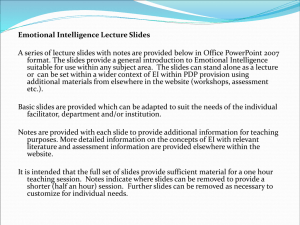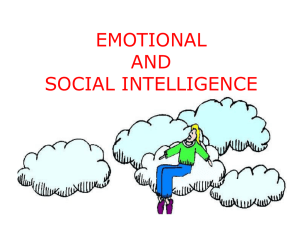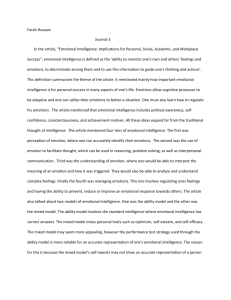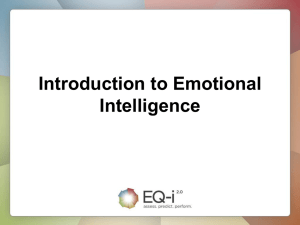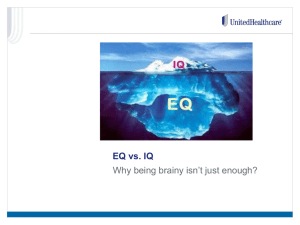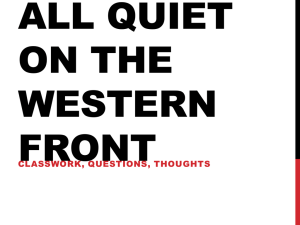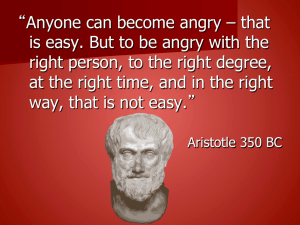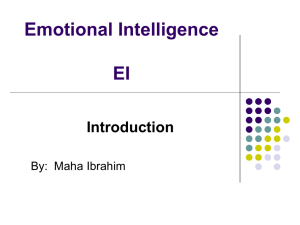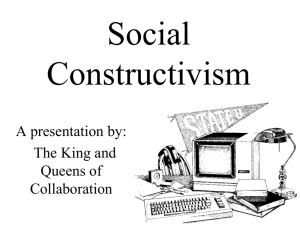Not IQ...EQ!!! - Utah Council for Worksite
advertisement
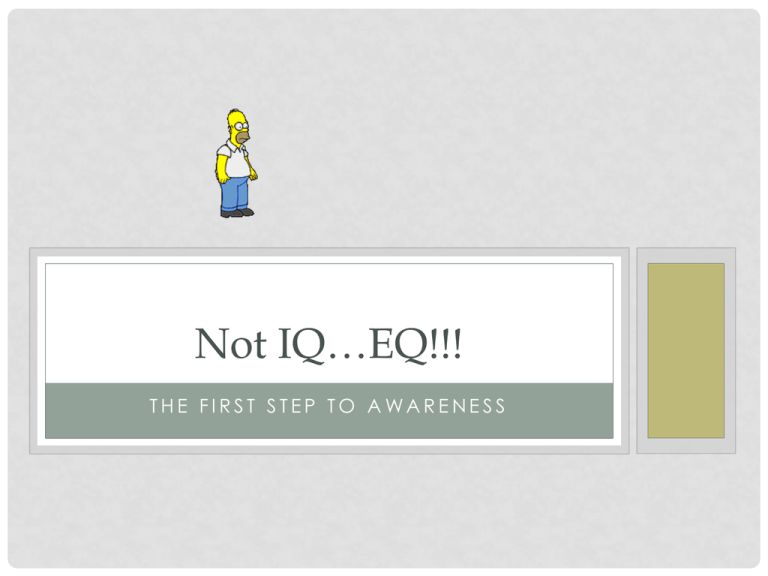
Not IQ…EQ!!! THE FIRST STEP TO AWARENESS An example of how what you don’t know can hurt you! • Nationally, what do you think is the #1 reason students fail a class or drop out of school… Stress! Another example of how What you don’t know CAN hurt you • Many people do not know how to recognize what they are feeling. • In some cases one does not realise what they are feeling until it is too late… Role film! Road rage, desk rage, campus violence, substance abuse, addictive behaviors, sleep disturbances, compulsive behaviors… • As we become aware of what we are feeling we can then employ our skills and resources to appropriately cope with the feelings. • Emotional health is a state of wellness that comes from understanding and acknowledging our emotions and finding appropriate ways to express them. Worksitehealthpromotion.org PERSPECTIVE EMOTIONAL INTELLIGENCE A measure of someone's ability to understand the emotions of themselves and others. (from “Emotional intelligence predicts job performance”2010) The ability to process emotional information and navigate the social world. (from “Emotional intelligence mapped in Brain”,2013) Emotional intelligence is the ability to understand: •Your own feelings and behaviors •The feelings, behaviors, and needs of others •Having empathy for new people GOOD EQ LINKED TO: • • • • • • • Better work opportunities Better work performance Better leadership Better relationships Better grades Better health Better recovery WHAT ARE PEOPLE SAYING ABOUT EQ: • Employers that seek to boost employees’ interpersonal skills, or emotional intelligence in the workplace are more successful Daniel Goleman • The resulting analysis indicates that high emotional intelligence does have a relationship to strong job performance (emotionally intelligent people make better workers). O'Boyle, E. H., Humphrey, R. H., Pollack, J. M., Hawver, T. H. and Story, P. A. (2011) THE LATEST SCIENCE • The study appears in the journal Social Cognitive & Affective Neuroscience that found specific regions in the frontal cortex (behind the forehead) and parietal cortex (top of the brain near the back of the skull) were important to both general and emotional intelligence. Study leader Aron K. Barbey, 2013 • "Historically, general intelligence has been thought to be distinct from social and emotional intelligence," …Barbey said… “the results [of the study]are of broader interest because they illustrate the interdependence of general and emotional intelligence in the healthy mind. IMPROVE YOUR EQ • You will need to use your hunches, instincts, and feelings to gather…facts, and information • It is critical to take an interest in others • to listen to others • you will need to be open to learning about another persons views, problems, and concerns. FIRST • What are emotions? • Emotions are information • There purpose is to guide us and let us know when a NEED is not being met. EXAMPLES: • When we feel lonely our connection needs with other people are not being met. • When we are afraid our safety needs are not being met. • When we feel rejected our acceptance needs are not being met. • To clue into the Needs that are not getting met you need to process the emotional information your are feeling. THERE ARE FOUR AREAS OF EMOTIONAL INTELLIGENCE #1 EMOTIONAL IDENTIFICATION • Your capacity for self-awareness: being aware of your feelings as they occur. • Being able to label specific feelings in yourself and others. • The ability to identify emotions in someone's face, tone of voice, and body language. • Discussing and communicating emotion clearly SELF AWARENESS • The Book WHY DO WE • Cringe • Sweat • Tingle THE ABILITY TO IDENTIFY EMOTIONS IN SOMEONE'S FACE, TONE OF VOICE, AND BODY LANGUAGE. • Fear • Horror • Terror • Joy • Happiness ? #2 USING EMOTION AS YOU THINK • The ability to use emotion as you analyze, problem solve, and make a decision. • Letting feelings guide what you think about something. WHAT WOULD YOU THINK? WHY? What would you do? Why? #3 EMOTIONAL UNDERSTANDING • Ability to solve emotional problems and dilemmas. • The ability to understand the inter-relationships between emotions, thoughts and behaviors. THE DILEMMA • Two young men, brothers, had gotten into serious trouble. They were secretly leaving town in a hurry and needed money. • Karl, the older one, broke into a store and stole a thousand dollars. • Bob, the younger one, went to a retired old man who was known to help people in town. He told the man that he was very sick and that he needed a thousand dollars to pay for an operation. Bob asked the old man to lend him the money and promised that he would pay him back when he recovered. Really Bob wasn't sick at all, and he had no intention of paying the man back. Although the old man didn't know Bob very well, he lent him the money. • So Bob and Karl skipped town, each with a thousand dollars. That are both bad choices… okay now answer • Which is worse, stealing like Karl or cheating like Bob? • for the Bob people…Why do you think it is worse cheating the old man? • For the Karl people…Why do you think it is worse to steal from a store? • Are your feelings helping you decide? #4 EMOTIONAL MANAGEMENT • The ability to take responsibility for your own emotions. • The ability to turn emotions into positive leaning experiences • The ability to help others identify their emotions. WHAT DO PSYCHOLOGISTS TEACH ABOUT EMOTION • There are only two states from which you can respond to any situation. love (and focus on honoring, edifying and validating the other person) fear (and focus on what you need). Every other response or emotion fits into these two categories. • There are two core fears which drive most human behavior. fear of failure (fear of not being loved, valued, appreciated or wanted) and the fear of loss (that you won’t have what you need, want or deserve) • When you experience fear you automatically cast the other person as the bad guy and yourself as the good guy. This rationalizes our own bad behavior. IN ESSENCE Knowing how to separate healthy from unhealthy feelings and how to turn negative feeling into positive ones. Fear Love
